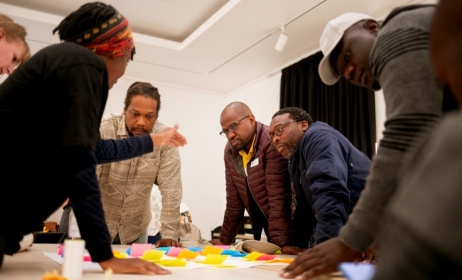Cultural policy in Mozambique
The cultural policy in Mozambique over the last five decades has reflected the changing political climate in the country. This article provides an overview of these changes and the impact they've had on the country’s cultural policy.
 Mozambique formulated its first official cultural policy in 1997. In the photo: Cheny Wa Gune. Photo: Werner Puntigam
Mozambique formulated its first official cultural policy in 1997. In the photo: Cheny Wa Gune. Photo: Werner Puntigam
Early cultural policy: 1975-1990
When Mozambique gained independence in 1975, it introduced a non-party system of government led by the revolutionary group known as FRELIMO (the Mozambique Liberation Front). In 1977, after the third FRELIMO Congress, the country adopted a Marxist-Leninist political ideology. The party took control of the state, defining the basic principles and programmes of socio-political life in the country. This situation persisted until 1990, when the Constitution was amended[1].
As such, from 1975 to 1990, Mozambique did not possess an official cultural policy. Instead, the country's cultural policy was informed by a combination of FRELIMO's revolutionary principles and ideas taken from the speeches of its leaders. Evidence of this can be found in the official documentation produced by the party, where, for instance, the liberation war was considered a force of “cultural emancipation”. Throughout this period, decisions related to culture deferred to recommendations from the first national meeting of the FRELIMO district committees, held in Mocuba, Zambezi Province, from 16 to 21 February 1975[2].
According to Siliya [1996], this document of recommendations was intended to form part of Mozambique’s first official cultural policy, although it was never submitted for approval by Parliament. Among other things, the document recommended: “To create commissions to collect and study all cultural manifestations of the country based on our people’s life, before colonialism, during colonialism, during clandestine struggle, the national liberation war, the defeat of colonialism and experiences acquired to the present moment; and to increment the cultural exchange at a national and international level.”[3]
Furthermore, Decree No 1/75 of 27 July was another important document informing cultural activity during this period. It defined the responsibilities of the Ministry of Education and Culture in the following terms: “It is the office of the Ministry of Education and Culture to create conditions for instruction, education and culture to be in the service of large masses, fighting energetically and systematically to end the illiteracy, ignorance and obscurantism inherited from colonialism.” The decree also stated that the Ministry of Education and Culture was to “promote and valorise all cultural manifestations of the Mozambican people, celebrating their revolutionary content and diffusing it at a national and international level to project Mozambican personality.”[4]
In conclusion, the cultural principles advanced by FRELIMO during this period advocated for social revolution: a complete transformation of society, the social construction of a “new man” and the formation of a government based on the power of the people. FRELIMO also refused the racialised idea of “blackness” and the concept of tribalism, positing that people from different ethnic, religious and regional origins could be united through the formation of a socialist society. In the words of Samora Machel: “For the nation to live, the tribe must die”[5].
Official cultural policy introduced
Mozambique’s first official cultural policy was introduced in 1997 as a consequence of political changes in the country. These changes were made possible by the new Constitution adopted by the country in 1990, which defended a multi-party system governance, private enterprise and freedom of expression. These reforms brought about a number of other social changes, including a peace agreement signed in 1992 between FRELIMO and RENAMO (the Mozambique National Resistance), ending the 25-year civil war and bringing about the country’s first general elections in 1994[6].
The new cultural policy was approved by the Council of Ministers through Resolution No 12/97 of June 10, 1997. In its preamble it states that “the cultural policy is a tool that regulates government activity in its articulation with other partners in promoting and developing culture.” Furthermore, one of its general objectives states that the “policy promotes the development of Mozambican culture and personality and guarantees free expression of Mozambican national values in close cooperation with living forces of society.”[7]
The new policy was, therefore, a product of the new political direction of the country, setting forth principles advancing the democratisation of culture and the promotion of Mozambique’s identity, as well as cultural diversity and the preservation and valorisation of cultural heritage. The state, within this new framework, saw its role change from progenitor to regulator in the development of culture[8].
Cultural policy post-1997
Since 1997, Mozambique has not introduced any new official cultural policies but instead has focused its attention on developing the creative sector from an economic standpoint. This has been attempted through various government plans and programmes, including the First National Conference on Culture (2003), the Mozambique Agenda (2005) and the Strategic Plan for Culture (2006)[9]. These initiatives have been undertaken with the goal of stimulating sustainable economic growth through the promotion and development of cultural assets[10].
Resources and citations:
- [1] Siliya, C.J., 1996, Ensaio sobre a cultura em Moçambique, Maputo, CEGRAF
- [2] ibid.
- [3] Author’s translation from Siliya (1996).
- [4] ibid.
- [5] http://paperroom.ipsa.org/papers/paper_17130.pdf
- [6] http://www.powerofculture.nl/en/policy/mozambique.html
- [7] http://www.wipo.int/edocs/lexdocs/laws/en/mz/mz018en.pdf
- [8] Saul, JS. Rethinking the FRELIMO state. The Socialist Register:1993
- [9] http://unctad.org/en/docs/ditctab20092_en.pdf
- [10] Landgraf, FL. Cultural policies in Mozambique: the socialist state open to the market economy. Paper presented to the Centre for Latin American Studies on Culture and Communication: 2014
Disclaimer: Music In Africa's Overviews provide broad information about the music scenes in African countries. Music In Africa understands that the information in some of these texts could become outdated with time. If you would like to provide updated information or corrections to any of our Overview texts, please contact us at info@musicinafrica.net.
Editing by David Cornwell


































Comments
Log in or register to post comments